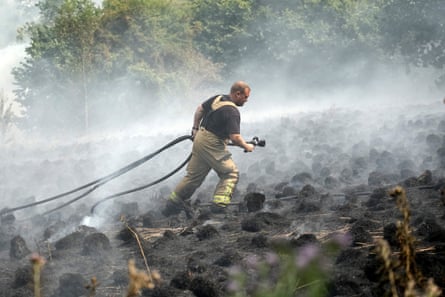Wellies and sun hats are the traditional first guard against the elements at festivals, but this summer they may not be enough to protect revellers. Flood defences, wildfire response teams and satellite weather-monitoring technology are among the ways UK music festivals are adapting to extreme weather events fuelled by the climate crisis.
Last summer’s record high temperatures in the UK hit during festival season, and the changing climate has become one of the industry’s biggest challenges, increasing the frequency, severity and likelihood of weather such as heatwaves and thunderstorms. With preparations underway for this year’s festival season, event organisers are increasing their contingency plans to secure their events, at a time of higher costs in labour, energy and insurance.
Standon Calling, a 17,000-capacity festival in Hertfordshire, has felt the force of extreme weather in recent years. In 2021, the team were preparing for a dry weekend and performances by Primal Scream and Craig David. “Forecasts weren’t suggesting we were going to get freak weather,” recalls founder Alex Trenchard. “Then we had double the average rainfall for July fall in around three and a half hours. It was extraordinary.”
The downpour left almost a third of the site flooded, with bosses forced to cancel the event on the final day. The evacuation was complicated as local access roads had been closed and some attenders had to leave their cars and belongings behind.
The following year, they dug flood irrigation trenches across the site – only to face a heatwave. “You’re now preparing for something that, even in the realms of extreme, is at the extreme end,” Trenchard says.
Unpredictable weather has been part of preplanning and risk assessment for UK music festivals for decades. The difference now is, bosses can’t look at past patterns to model their plans.
“Throughout the world, and in the UK, we’re seeing unprecedented weather events,” says Ric Robins from the Met Office, who has spent 40 years following British weather and works with events to disseminate weather warnings. “We’re going to have to make plans for weather events that we haven’t seen yet, but are now plausible,” he adds.
That will be difficult, because most festival sites are under construction by the time they receive accurate data. “It’s around five to seven days [before the event] when the forecast settles down into something you can plan for,” explains Robins. As a result, festival organisers – under scrutiny from local authorities, emergency services and insurance companies – must now prepare in advance for multiple extreme weather scenarios.
Jane Healy is responsible for the water and sanitation provisions at festivals such as Glastonbury and Boomtown, a 60,000-capacity festival in Hampshire where, in August 2022, temperatures peaked around 40C. She recalls there was concern about localised drought. To protect festivalgoers’ welfare, the team were trucking in tankers of extra water, trying to keep it cool enough to drink and using it to dampen down dust.
“When you haven’t planned for extreme weather, it’s easy to fall back on the old ways,” she says. For example, shipping in plastic bottles of water. “Quick options, like anything in life, aren’t normally the most sustainable. You’ve got to have your contingencies, even if you don’t use them.”
These types of weather events mean festivals are scaling up plans every summer. More than half a million people attend Festival Republic’s events each year, such as Reading and Leeds, Wireless and Download. Last year, the organisers saw the damage caused to homes and villages by wildfires and adapted their plans.
“We increased fire crew teams and fire appliances,” says group managing director Melvin Benn. “Instead of our fire teams being central, we created hubs so response times would be shorter.” Real-time monitoring is key. “We contract a satellite weather service, which costs an awful lot of money. It gives us literally minute-by-minute anticipation. I’ve used this technology to keep shows going.”
All this necessary adaptation comes at a time of budgeting strain for the festival sector. “Issues of climate change affecting festivals aren’t happening on their own,” says Trenchard. “It’s alongside other factors, such as cancellation insurance. The premiums are rising year-on-year because insurers are having to pay out on weather-related claims.” Already this year, record rainfall has meant Laneway festival in Auckland was called off.
The positive news, though, is that festivals are increasingly engaged when it comes to their contribution to global heating. “Ten or 15 years ago, there was a handful of people championing this stuff,” says John Rostron of the Association of Independent Festivals, which represents 105 events with a combined audience of 1.3m music fans. “Now, it’s very much a guiding star. Every aspect of a festival can engage in considering the climate and sustainability: whether that’s how you travel there or the energy driving the power or water usage on site.”
Events such as Northamptonshire’s Shambala and Amsterdam’s DGTL are leading the way, with organisations like A Greener Future, Julie’s Bicycle and Vision 2025 sharing sector knowledge and helping drive standards. Ticket holders, Rostron says, now “demand to see” sustainability efforts.
Like many others, Rostron is calling on the government to do more; the UK’s current net zero strategy shows they will miss 2030’s emissions cuts target. “The biggest future challenge for us is the lack of action on the climate,” he says.
“We don’t want to have a conversation about how we are going to go to festivals facing extreme weather in 2030, when it could be: ‘Let’s not have more extreme weather in 2030.’ That’s a better conversation to have, isn’t it?”

